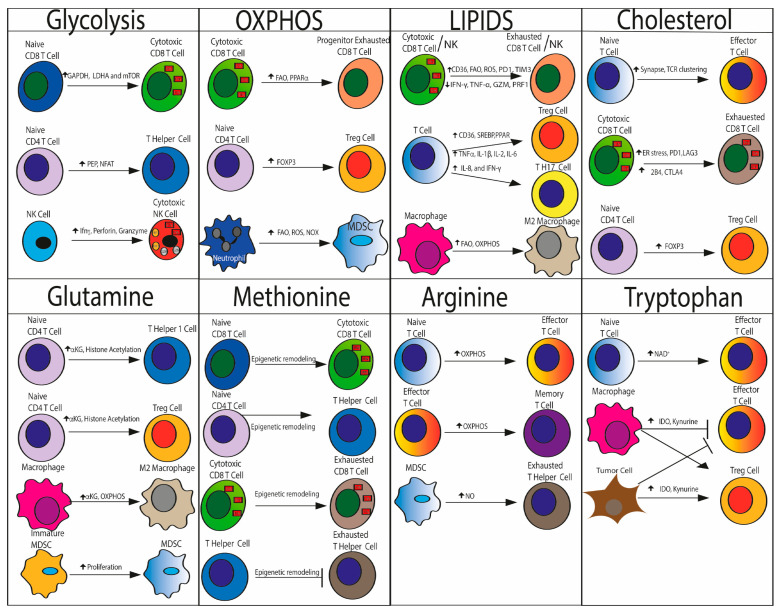Figure 3.
Metabolic changes in TME regulates adaptive and innate immune system function. Glycolysis supports naïve CD8 and CD4 T cells and NK cell activation. Progenitor exhausted T cells, Tregs and MDDSC rely on oxidative phosphorylation (OXPHOS) and fatty acid oxidation (FAO) Increased concentration of FFAs within TME leads to CD8 T cell and NK exhaustion, renders T cell exhausted and anergic, and promotes the differentiation of CD4 T cells into Tregs and Th17 and skews macrophage polarization toward protumoral M2-like TAMs which mainly depend on FAO and OXPHOS for their metabolism and bioenergetic demands. Glutamine metabolism promotes CD4 T cell differentiation towards Th1 and Treg cells, TAM polarization towards the protumor M2 phenotype and MDSC expansion. Methionine metabolism regulate T cell activation and exhaustion by remodeling epigenetic landscape. Arginine enhances T cells survival and supports effector and memory T cells generation by modulates OXPHOS activity, whereas production of nitric oxide from arginine catabolism by MDSC-expressed arginase leads to Thelper cell dysfunction and anergy. Tryptophane is required for T lymphocyte effector functions as promotes NAD+ synthesis. Conversion of tryptophan to kynurenine via IDO1, expressed by tumors and macrophages, promotes Treg expansion and renders effector T cells exhausted. Cholesterol improves cytotoxic function by enhancing immunological synapse formation and maturation, and promoting TCR clustering and signaling. Instead, high cholesterol content in TME hampers T cell function as induces ER stress and expression of exhaustion markers, such as PD-1, LAG-3, TIM-3, 2B4 and CTLA-4. Finally cholesterol induces FOXP3 expression and promotes Treg differentiation. LDHA: lactate dehydrogenase A; GAPDH: glyceraldehyde-3-phosphate dehydrogenase; PEP: phosphoenolpyruvate; NFAT-1: nuclear factor of activated T cells; lfnγ: interferon-γ; PRF1: perforin; GZM: granzyme B; α-KG: α-ketoglutarate; NO: nitric oxide; OXPHOS: oxidative phosphorylation; FAO: fatty acid oxidation; ROS: reactive oxygen species; NOX: NADPH oxidase isoforms.

